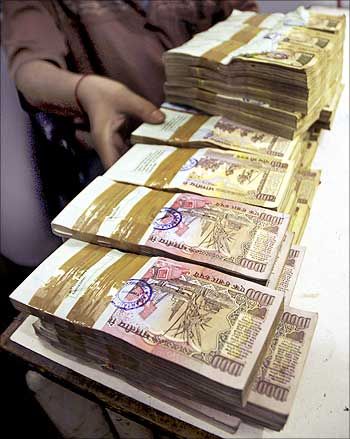I have been a permanent resident of the United States since 2008 and I am thinking of getting US citizenship and renouncing my Indian citizenship.
1. Should I continue to have ownership of my inherited agricultural land? Does renouncing Indian citizenship automatically remove my name as owner of that land?
2. What are the ways to continue to have ownership of inherited agricultural land even after becoming a US citizen?
3. Does having a Person of Indian Origin/Overseas Citizenship of India status help in this matter?
— Ashish
 It appears that you had the possession of the agricultural property when you were a Resident in India. If that is the case, you can continue to hold the property. There is no need to inform the Reserve Bank of India.
It appears that you had the possession of the agricultural property when you were a Resident in India. If that is the case, you can continue to hold the property. There is no need to inform the Reserve Bank of India.
While selling agricultural land or plantation property or farm house, a Non Resident Indian can sell the property or gift it to a resident. A PIO also has similar rights, but he can sell or gift the property only to Indian citizens permanently residing in India. No other transactions are permitted.
In other words, getting US citizenship will in no way affect your right of being able to own or hold the agricultural land in India. If and when you wish to sell it, you will have to ensure that the sale is made only to an Indian resident. Getting a PIO card or OCI will in no way affect this issue, positively or otherwise.
I have US citizenship. This year, I have accepted long-term employment (three years at least) in India. My basic stay and other living expenses will be taken care of. I think I will end up saving a substantial amount of my salary. How can I transfer this money to the US? Is there any maximum amount or upper limit for such a transfer?
— Vicky Arora
PIO (Indians with foreign passport) who have taken up residence in India temporarily on account of their employment, profession or other activity (irrespective of its duration) with the intention of eventually going abroad, fall under the Foreign Exchange Management Act category of ‘foreign nationals not permanently resident in India.’
You can remit your entire net salary after deduction of taxes, contribution to Provident Fund and other deductions.
Strangely, it appears that such a person is not allowed to have Non Resident External or Foreign Currency Non Resident account in India since he has become ipso-facto, a Resident in India.
Recently, I received some inheritance money in India, which I parked temporarily in my NRO account. The tax deducted at source on NRO is 30.9 percent and it is almost impossible to get a refund. Therefore, instead of starting an NRO fixed deposit or some such thing, I was intending to transfer the funds to the US. In the process of doing so, in one of the emails, my bank mentioned that this money could also be moved into my NRE account ‘after paying tax?’
I have been under the impression that NRO money cannot be credited to the NRE account. Does this mean that we can open NRE fixed deposits with NRO money? NRE interest is tax-free in India so there is no question of TDS. Also, the rates on offer are great.
What tax is the banker email referring to? As per my chartered accountant, the inheritance funds are tax-free.
— P Ved
Hitherto, funds from the NRO account could be remitted overseas (overseas with respect to India) up to a limit of the equivalent of $1 million per financial year. However, these same funds could not be credited to the account holder’s NRE account. This was illogical. Recently, this anomaly has been rectified.
Now, funds from the NRO account can be simply credited to one’s NRE account — the paperwork for doing so is similar to that required for remitting the funds abroad. Therefore, the transfer from NRO to NRE can only be effected upon submission of Forms 15CA and 15CB.
The tax being referred to is any tax if due. For example, if any funds are credited to the NRO account upon sale of property — normally the buyer of the property has to deduct tax at source. But sometimes, this is not done by the buyer and the onus of paying the tax falls upon the NRI concerned. Now, this money lying in the NRO account can be credited to the NRE account, but not in toto, but only after paying the due tax.
The inheritance money received by you is indeed not taxable since India does not impose any inheritance tax yet. So these funds may be transferred to the NRE account. However, submission of the forms is a must — the CA certificate (Form 15CB) will mention that no tax was due.
I am a pensioner living in Canada. My Indian pension is being credited to my Indian bank account. I was using it to defray the costs during my visits to India. Now my health may not permit frequent visits. I am thinking of transferring the Indian pension amount to my bank in Canada.
From past columns, I understand that I will have to submit Forms 15CA and CB. How do I get the form 15CB signed by CA in India while I am here in Canada? What is the RBI address to which Form 15CA and Form 15CB should be sent?
— M V Jain
For remitting funds, Form 15CA (undertaking) and Form 15CB (CA certificate) have to be provided. Form 15CA has to be filled online with a system-generated printout; Form 15CB can be obtained from the CA.
It is the submission of Form 15CA from a remote location (as compared to the Indian bank) that is more challenging than submission of Form 15CB. The CA concerned could be requested to hand over the signed certificate to the bank — and as both parties (CA as well as the banker) could be at the same location in India, this can be achieved easily.
However, when it comes to Form 15CA, the same has to be necessarily printed out at the NRI’s location (for his signature, etc). The only solution then is to mail the signed printout to the bank.
Both these documents — Form 15CA and 15CB have to be submitted to the bank and not to the RBI. Normally, the submission would be at the same place in which your account is located.










